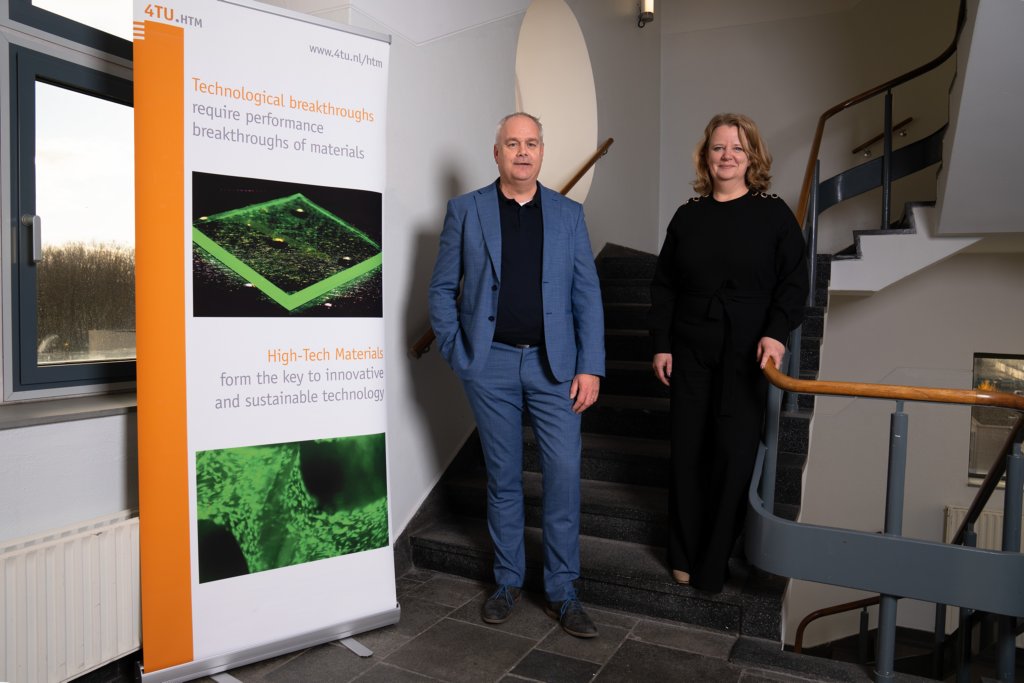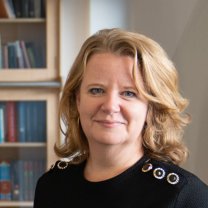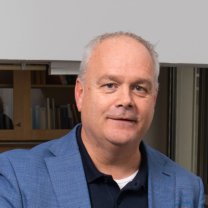Cooperation between 4TU.High-Tech Materials and Groningen Engineering Center
Text and interview: Anne Blair Gould
Photography: Alyssa van Heyst
As from the 1st of January 2023, some of the Centres of the 4TU.Federation will collaborate with a number of institutes of the University of Groningen (UG). 4TU.High-Tech Materials and Groningen Engineering Center will join forces in organising joint materials science activities. With respect to Advanced Characterisation Groningen can contribute not only via Zernike Institute for Advanced Materials but also via the Stratingh and ENTEG institutes.
The 1st of January 2023 marked the start of a formal collaboration between RUG - Advanced Materials and 4TU.HTM – what is the thinking behind this?
Arjan: “Materials science and engineering research and education is covered to a large extent by 4TU.HTM, uniting the high-tech materials research groups within the technical universities of Wageningen, Twente, Eindhoven and Delft. But there is also a huge community of excellent materials scientists in Groningen. We are already connected informally in specific fields of materials science research but with a more formal collaboration, there is greater potential for sharing facilities and expertise.
Moniek: “Although Groningen is not officially a technical university, we do train engineers and we are a broad university. For instance, at the Zernike Institute where I am, we cover a large range of disciplines from theoretical physics, via quantum materials, biophysics, physical chemistry, all the way through to inorganic and polymer chemistry, covering the full spectrum of materials from the fundamental level all the way through to the application. This is unique for any university and it will also be complementary to the technical universities.”
What does Groningen do that the other technical universities don’t?
Moniek: “As well as fundamental research and the full breadth of materials covered by Groningen and other institutes, there is also a strong emphasis on Advanced Characterisation, which I think is useful for every materials scientist. Some of that is done at the technical universities as well, but it is a particularly strong focus at the Zernike Institute where we develop techniques, instrumentation, methodology and theory. Moreover, within this 4TU.HTM Advanced Characterisation theme, Groningen can contribute not just via Zernike but also via the Stratingh and ENTEG institutes, that focus more on molecular chemistry and engineering, respectively.”
This collaboration will initially run for two years - what are you hoping to achieve in that time?
Arjan: “Currently we are organising joint activities on certain themes, one of which is Advanced Characterisation, and indeed Groningen will be contributing to that. Advanced characterisation is a way to understand in detail the structures and physico-chemical properties of materials, and it can involve microscopic and spectroscopic techniques or other chemistry- and physics-based techniques. Not all materials are easy to characterise, either because of the nature of the material or the nature of the product, so advanced characterisation techniques can help us for example look inside larger-scale materials, to resolve buried layers and interfaces, or provide chemical information not easily studied using more common characterisation techniques.”
Moniek: “We also look at the materials we use during processes, so while the materials function, e.g. perform in a reaction, either doing something themselves or facilitating or accelerating another reaction. If we can understand better how these work, down to the atomic level, we can try to optimise that process or material. So it is essential to characterise the material while it is doing what it is supposed to do.”
Within the field of Advanced Materials, where will be the focus of your collaborative research?
Arjan: “Typically we will go towards more extreme conditions – higher, deeper, and more extreme conditions in terms of corrosivity, temperature and pressure. But during the process of making or using a material, it is difficult to look at the chemistry or physics using conventional techniques to see, for example, how the material microstructure is evolving during processing, or degrading as a function of service lifetime. So it will be great to have those capabilities in place to be able to see how the material is evolving during the actual processes of production and use”
“Also, because we are in a period of energy- and materials transitions, these advanced characterisation techniques will become more and more important because we need to develop new types of materials to meet these new challenges.”

4TU.HTM represents many aspects of materials science, from fundamental to applied research, from nanotechnology to construction, all of which will be heavily influenced in the coming years by sustainability criteria. Can you give some examples of where advanced materials research is tackling this sustainability challenge?
Arjan: "For example, there is a lot of research going into the development of so-called ‘Green steel’ using hydrogen rather than fossil fuels as a way to decrease future carbon dioxide emissions. As materials scientists, we not only have to understand the process but also how these new materials are synthesised (e.g. energy and CO2 footprint) and how they will behave after processing in their actual use. Other high-potential and important research directions are materials for energy conversion and energy storage.”
Moniek: “And aside from the energy transition, we also need new materials for healthcare - for example implants – as well as quantum computing, memory devices and other areas. So there are many materials-based applications that still need a lot of work, to which we can contribute.”
“It is also clear that we need to think about sustainability and circularity in the entire process, so from synthesis of the material right through to the engineering, manufacturing and recycling of a product. Historically, we mostly focussed on the development of beautiful, novel, high-performance materials and didn’t really think about the availability of individual components or potential recycling after that. But we need to be aware of the impact we have on climate and environment, as well as possible dependence on other countries..”
What do you hope to have achieved two years from now?
Moniek: “More and more solid, long-standing collaborations! Now any existing collaboration is more on a one-to-one basis, between people who happen to know each other, but in the future, it is becoming increasingly important that we can find each other easily and know who has what expertise. That is also important for obtaining funding for the bigger projects, where there is often a lot of money involved and you need to form consortia. If you know each other already, have a strong network and a collaborative mindset, then you can be better prepared for the bigger challenges.”
Arjan: “I would not say that materials science is an underestimated science, but without materials science and engineering, none of the structures and products around us would be able to function as they do. This means that materials science research will become more and more important as we go to more extreme conditions. We have picked the low hanging fruit in terms of energy- and materials-sourcing and -applications so we now need to go deeper and higher, which will be more difficult so we need to be more efficient. The challenges will remain and materials science, I like to think, will be an on-going science, an ever-lasting craft for future engineers.”
Moniek: “Also both in the Netherlands and across Europe, we are highly dependent on other continents for specific materials. This forces us to develop different materials from more abundant and locally available materials, as well as increase recycling and refining efforts. So sustainability is not the only challenge – there are also these political and ethical dimensions.”
Where is materials science research in the Netherlands rated globally?
Moniek: “The Netherlands is internationally recognised for its materials science excellence, and that is because we cover the entire range of materials as well as all the required disciplines. And it is this combination of expertise and knowledge that is needed to fully understand the materials as well as develop novel ones. Also historically the Netherlands has had an extensive materials industry including the catalysis industry and, of course, materials processing companies like Tata Steel. So there is a lot of knowledge and experience in these companies that we can and need to use in our efforts towards making our materials more sustainable and our processes much cleaner.”









